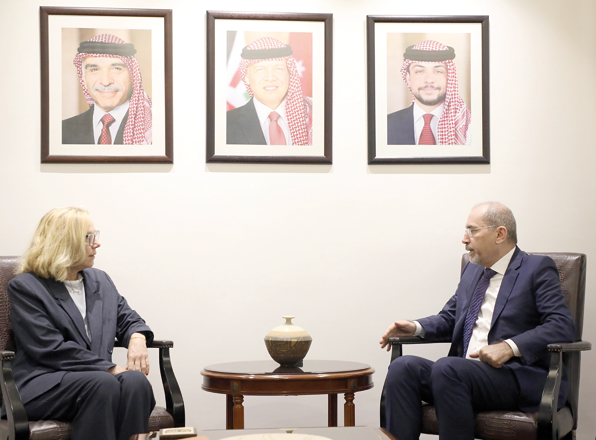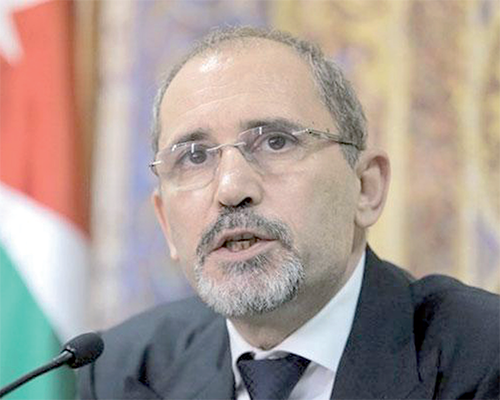You are here
Safadi warns Israel’s extremist agenda to doom region into more wars
By JT - Jan 20,2024 - Last updated at Jan 20,2024
AMMAN — In an interview with the BBC World Service on Friday, Deputy Prime Minister and Foreign Minister Ayman Safadi shared his view on Israeli prime minister Benjamin Netanyahu's response to the US plan regarding the Israeli-Palestinian conflict.
Regarding a Netanyahu's stance on preventing the establishment of a Palestinian state, Safadi said that Netanyahu's recent comments align with his decade-long policies, emphasising actions on the ground, such as building settlements and confiscating land, which undermine the viability of a two-state solution.
The minister added that Netanyahu's statement does not come as a surprise, citing a longstanding pattern of actions hindering the emergence of a Palestinian state. He also expressed concern about the potential for increased violence and unrest in the region due to these actions.
“Netanyahu has been approaching the Palestinian issue as a security issue for over 15 years. What good has that done? Every year, every two years, we find ourselves in the same spot of violence and war, simply because the root cause of the problem has not been addressed.”
Safadi also emphasised the importance of addressing the root cause of the conflict, adding that “the root cause of the conflict is the Israeli occupation that denies the Palestinian people their rights”.
He also stressed the need for a peaceful solution that grants Palestinians their rights while ensuring Israel’s security, echoing a collective Arab commitment since 2002 to guarantee Israel’s security upon the establishment of a Palestinian state.
“The main answer, the only answer to this conflict is a peaceful solution that would give Palestinians their rights and give Israelis their security.”
“And since 2002, all of us in the Arab world have come out collectively and said in return for Israel withdrawing from the occupied territories and the establishment of a Palestinian state, we will all guarantee Israel’s security. So to what he’s saying, we say history has shown, facts on the ground have shown that suffocating the rights of Palestinians will not guarantee security.”
In response to the challenge of guaranteeing Israel’s security amid differing views within the region, Safadi said that addressing the Palestinians’ grievances would reduce the appeal of violence. He also emphasised that if Palestinians achieve their rights, groups like Hamas would lose their rationale for fighting.
“Hamas wants to fight for the rights of the Palestinian people to freedom and statehood. If the Palestinian people have their rights fulfilled, then Hamas will have nothing to say because its own people will say, why do we want to go to war?”
Also on Saturday, during an interview with Al Jazeera English Safadi addressed the ongoing Israeli aggression on Gaza, stressing the continuation of Palestinian casualties, destruction of infrastructure, and a recent attack on the Jordanian field hospital.
Safadi said that this war is part of a systematic Israeli policy to make life unbearable for Gazans, aligning with the declared objective of some Israeli ministers to force Gazans out. Furthermore, He expressed concerns about Israel’s actions in the West Bank, where he stressed economic suffocation, denial of religious rights, and violence against Palestinians.
The minister also highlighted that Prime minister Netanyahu has consistently opposed a two-state solution, citing previous statements where Netanyahu expressed pride in preventing the establishment of a Palestinian state and stifling Palestinian aspirations for freedom. He also highlighted that the tactical delay of the war by Netanyahu aims to prolong his term in office while pursuing an agenda contrary to the two-state solution.
“Israeli Prime Minister might be consciously provoking confrontations on other fronts, particularly with Lebanon and other parts of the region to delay the political reckoning that he will have to face.”
Safadi also emphasised Jordan’s steadfast rejection of any Israeli proposition to maintain control over the occupied Palestinian territories, including Gaza, the West Bank and East Jerusalem, adding that such a scenario would only lead to war, and it is a position the Kingdom has consistently opposed and will continue to do so.
The foreign minister also highlighted the potential dangers of the recent attacks in Iraq and Syria, noting that these conflicts could expand into a more fundamental crisis. He emphasised that “warnings about the Israeli aggression on Gaza spilling over into the wider region had been issued from the start”, adding that “Netanyahu is consciously provoking confrontations on multiple fronts, including Lebanon and Syria, as a strategy to delay the political consequences he might face”.
Safadi also stressed that Jordan and Arabic countries are actively engaged in efforts to address the situation, emphasising that ideas are being articulated, and plans are in progress to formulate a comprehensive strategy. He outlined the vision for a plan that begins with the end game, advocating for the recognition of an independent Palestinian state based on the borders of June 4, 1967, with Jerusalem as its capital. However, he emphasised that the primary responsibility lies with the Israeli government, which he said is “defying not only the will of Arabs but also the entire international community with its ongoing aggression”.
Safadi also underscored ongoing collaboration with international partners, indicating an upcoming meeting with European foreign ministers, alongside counterparts from Saudi Arabia and Egypt. The objective is to “garner support not only for ending the current aggression but also to unite behind a comprehensive plan that aims to terminate occupation and set the region on an irreversible path towards peace”, he added. He also urged the Arab world to contribute to these efforts and revealed ongoing discussions with the United States, to take a lead role in advancing the proposed plan.
Safadi highlighted ongoing efforts to rally public opinion against the policies pursued by Israel, stressing that the focus is on putting forward proposals through consultations rather than rigid plans. He underscored the importance of the will of Israel to engage in serious negotiations for peace and the will of the international community to take action if Israel persists in denying the region the peace it deserves.
Regarding the legal case at the International Court of Justice, Safadi reiterated support for South Africa’s case, and he noted that “when the time comes for submission of legal arguments, Jordan will actively participate in accordance with the court’s procedures”.
Related Articles
AMMAN — Deputy Prime Minister and Foreign Minister Ayman Safadi on Monday participated in the meeting of the European Union's (EU) For
AMMAN — Deputy Prime Minister and Foreign Minister Ayman Safadi warned on Thursday of the worsening humanitarian crisis facing the Gaza Stri
AMMAN — Deputy Prime Minister and Foreign Minister Ayman Safadi has denounced the recent escalation between Iran and Israel, emphasising tha


















